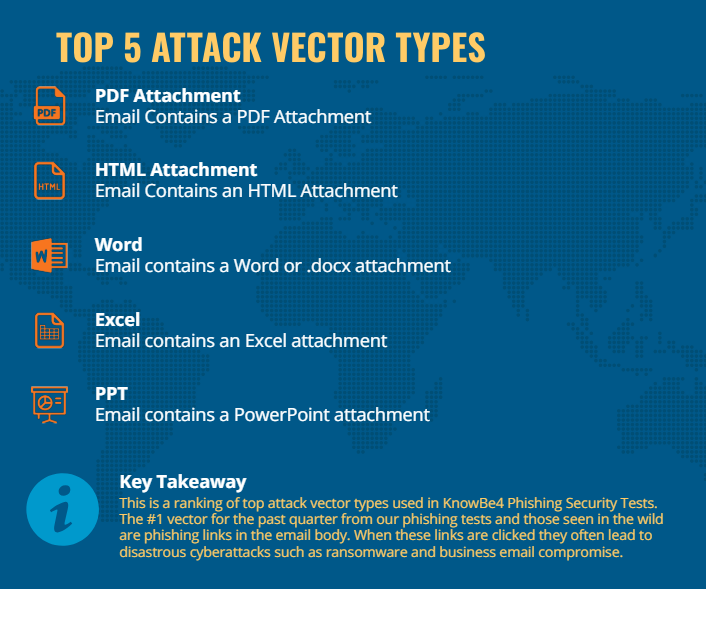HR and IT Related Emails are the Top Choices for Phishing Scams
KnowBe4’s Q1 2024 global phishing report finds that HR and IT related email subjects account for more than 42% and 30% of top phishing email subjects respectively
Organizations are targeted by advanced phishing scams, generated by Artificial Intelligence tools. Leading security awareness training and simulated phishing platform, KnowBe4 announced the results of its Q1 2024 top-clicked phishing test report. The results include the most common email subjects clicked on in phishing tests, reflecting the persistent use of HR or IT-related business email messages that captivate employees’ interests.
Phishing emails continue to be one of the most common methods for executing cyberattacks on organizations worldwide.
KnowBe4’s 2023 Phishing by Industry Benchmarking Report reveals that nearly one third of users are susceptible to clicking on malicious links or complying with fraudulent requests. As a result, cybercriminals take advantage of this vulnerability and leverage the innovative tools available to them, such as AI, to come up with increasingly sophisticated messages to outsmart users. These bad actors tailor phishing email strategies to appear more legitimate in their requests and trick employees by inciting an emotional response and urgency to click on a malicious link or download an infected attachment.

Related Story: The Risks Threatening Employee Data in an AI-Driven World
HR-related phishing attacks take the top spot at 42%, a trend that has persisted for the last three quarters, followed by IT-related phishing emails at 30%. Phishing emails from HR or IT departments that prompt dress code changes, tax and healthcare updates, training notifications and other similar actions are effective in deceiving employees as they can affect a user’s work, evoke an immediate response and can cause a person to react before thinking about the validity of the email.
The KnowBe4 phishing report this quarter also noted more personal phishing email attacks, such as tax, healthcare and ApplePay, that could affect users’ sensitive information. These types of attacks are effective because they cause a person to react to a potentially alarming topic and engage to protect their private information before thinking logically about the credibility of the email.
“KnowBe4’s report shows that cybercriminals are becoming increasingly tactical in exploiting employee trust by using HR-related phishing emails due to their seemingly legitimate source,” said Stu Sjouwerman, CEO of KnowBe4.
Recommended Read: 10 AI ML In Data Storage Trends To Look Out For In 2024
Stu added, “Emails coming from an internal department such as HR or IT are especially harmful to organizations since they appear to be coming from a trusted source and can convince employees to engage quickly before confirming their legitimacy, exposing the company to security vulnerabilities. A well-trained workforce is therefore crucial in building a strong security culture and serves as the best defense in safeguarding organizations against preventable cyberattacks.”
KnowBe4, the provider of the world’s largest security awareness training and simulated phishing platform, is used by more than 65,000 organizations around the globe. Founded by IT and data security specialist Stu Sjouwerman, KnowBe4 helps organizations address the human element of security by raising awareness about ransomware, CEO fraud and other social engineering tactics through a new-school approach to awareness training on security.
Top Story of the Month: As Advertising Fatigue Grows, It’s Time To Let Creative Content Marketing Shine!

Comments are closed.